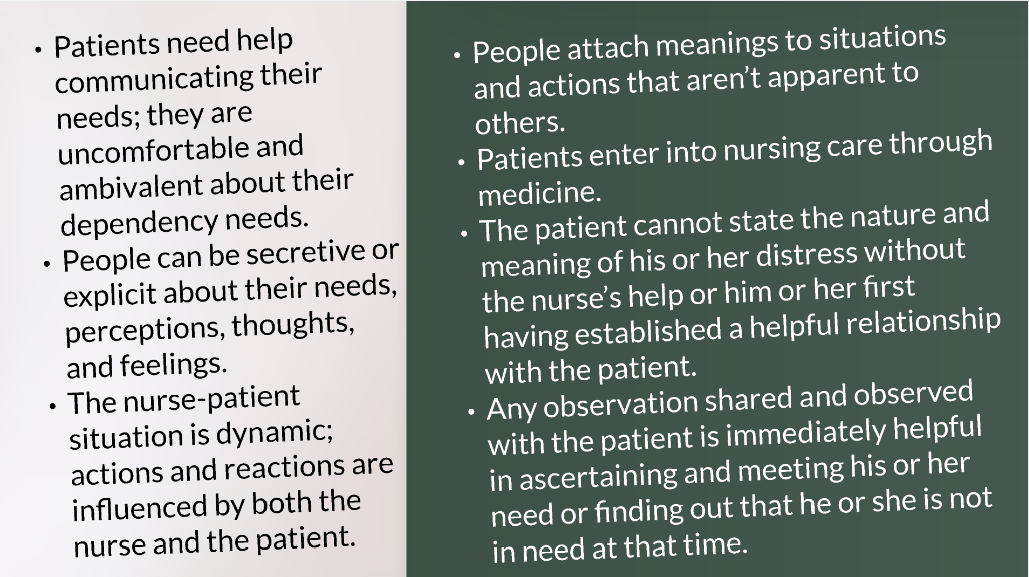TFN - Ida Jean Orlando: Deliberative Nursing Process Theory
1/26
There's no tags or description
Looks like no tags are added yet.
Name | Mastery | Learn | Test | Matching | Spaced | Call with Kai |
|---|
No analytics yet
Send a link to your students to track their progress
27 Terms
Ida Jean Orlando
Who proposed the Deliberative Nursing Process Theory?
Yale University School of Nursing
Developed her theory from a study conducted at?
Deliberative Nursing Process Theory
Focuses on how to produce improvement in the patients behavior. Evidence o relieving the patient’s distress is seen as positive changes in the patients observable behavior.
Ida Jean Orlando
One of the early thinkers in nursing who proposed that patients have their own meanings and interpretations of situations and therefore nurses must validate their inferences and analyses with patients before drawing conclusions.
Reciprocal relationship between patient and nurse
Ornaldo’s theory stresses the _______. What the nurse and patient say and do affects them both.
When they require nursing care where their needs for help cannot be met independently because they have physical limitations, have negative reactions to an environment, or have an experience that prevents them from communicating their needs.
When does a person become a patient?
Unmet needs for help
Patients experience distress or feelings of helplessness as the result of __________.
immediacy
Orlando proposed a positive correlation between the length of time the patient experiences unmet needs and the degree of distress. Therefore, _________ is emphasized throughout her theory.
do not feel distress and do not require care
In Orlando’s view, when individuals are able to meet their own needs, they ___________ and _________ from professional nurse.
Perceptions, thoughts, and feelings
It is crucial for nurses to share it so they can determine whether their inferences are congruent with the patients needs.
The behavior of the patient
The reaction of the nurse
The nursing actions which are designed for the patient’s benefit.
Nursing process theory
Role of nurse
To find and meet the patient’s immediate need for help.
During the nursing process
When does the nurses find out the nature of the distress and what helps the patient.
Clear, concise, and easy to use
What is the strength of this theory?
Need
is a situationally defined requirement of the patient which relieves or diminishes his immediate distress if this is supplied.
Presenting behavior of patient
any observable verbal and nonverbal behavior of the patient.
Immediate reactions
the nurse's and patient's individual perceptions,thoughts, and feelings.
Deliberative nursing actions
those decided upon after ascertaining a need and then meeting this need.
Nursing process discipline
• includes the nurse communicating to the patient his or her own immediate reaction
• made in order to ask for validation,clarification, or correction from the patient
• once referred to as the "deliberative nursing process."
Automatic nursing actions
• nursing activities that are decided upon for reasons other than the patient's immediate need.
• When patients cannot cope with their needs on their own, they become distressed by feelings of helplessness.
• In its professional character, nursing adds to the distress of the patient.
• Patients are unique and individual in how they respond.
• Nursing offers mothering and nursing analogous to an adult who mothers and nurtures a child.
• The practice of nursing deals with people, the environment, and health.
Theory Assumptions

Theory Assumption
Metaparadigms (Nursing)
Orlando speaks of nursing as unique and independent in its concerns for an individual's need for help in an immediate situation. The efforts to meet the individual's need for help are carried out in an interactive situation and in a disciplined manner that requires proper training.
Metaparadigms (Person)
Orlando uses the concept of human as she emphasizes individuality and the dynamic nature of the nurse-patient relationship. For her, humans in need are the focus of nursing practice.
Metaparadigms (Health)
In Orlando's theory, health is replaced by a sense of helplessness as the initiator of a necessity for nursing. She stated that nursing deals with individuals who require help.
Metaparadigms (Environment)
Orlando completely disregarded the environment in her theory, only focusing on the patient's immediate need, chiefly the relationship and actions between the nurse and the patient (only an individual in her theory; no families or groups were mentioned). The effect that the environment could have on the patient was never mentioned in Orlando's theory.
• Since the premise of Orlando's theory is in the immediacy of help needed by patients, this framework will be important for nurses who are assigned in special clinical areas that require quick decision making and critical thinking skills. Such areas are the OR, ER, and ICU/Critical Care Unit.
• Orlando's theory stresses the reciprocal relationship between patient and nurse remains a most effective practice theory that is especially helpful to new nurses as they begin their practice.
Application of the theory